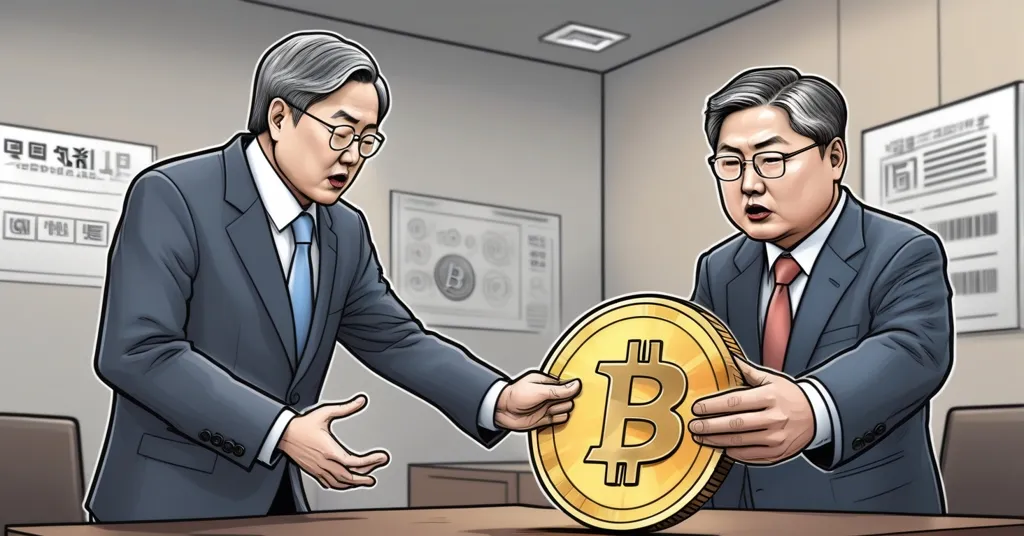South Korea Rejects Bitcoin Reserves, Explores Won-Backed Stablecoin

Bitcoin In Reserves? South Korea’s Central Bank Won’t Bite
South Korea’s central bank, the Bank of Korea (BOK), has firmly rejected the inclusion of Bitcoin in its foreign exchange reserves, citing the cryptocurrency’s significant price swings and failure to meet International Monetary Fund (IMF) standards. However, local advocates and legislators are pushing forward with plans for economic diversification and a won-backed stablecoin.
- BOK rejects Bitcoin in reserves due to volatility and non-compliance with IMF standards.
- Global interest in Bitcoin reserves grows, led by the U.S. and El Salvador.
- South Korea explores economic diversification and a won-backed stablecoin.
- Regulatory frameworks for crypto exchanges and digital assets are being developed.
The BOK’s decision came in response to an inquiry from Representative Cha Gyu-geun of the National Assembly’s Planning and Finance Committee. The central bank highlighted Bitcoin’s extreme volatility and its inability to meet the IMF’s criteria for reserve assets, which require an investment-grade credit rating, usability, and liquidity. As The Korea Herald reported, “The central bank of South Korea is not buying into the (popular) notion of including Bitcoin in its foreign exchange stockpile, citing the cryptocurrency’s extreme price volatility and lack of recognition as a reserve asset under international standards.”
While the BOK remains cautious, the global trend leans in a different direction. Countries like the United States and El Salvador are actively considering or implementing Bitcoin reserves. Former President Donald Trump has expressed interest in a strategic Bitcoin reserve for the U.S., although no such reserve has been established yet. El Salvador, on the other hand, has already integrated Bitcoin into its financial strategy as a hedge against currency risks. Could this cautious approach protect South Korea from the risks of volatile digital assets, or is it missing out on potential opportunities?
Locally, South Korean legislators and crypto advocates are not ready to abandon the potential of cryptocurrencies. They argue that Bitcoin could serve as a tool for economic diversification, offering new avenues for growth and stability. Additionally, there’s a push for the development of a won-backed stablecoin. This stablecoin could position South Korea more favorably in the digital asset market, catering to the significant interest among the country’s youth, who view cryptocurrencies as a path to financial independence amidst political uncertainty and high unemployment.
South Korea’s culture of embracing micropayments in social media and gaming has fostered a crypto-friendly environment, explaining the country’s high crypto adoption rates. Yet, the BOK’s stance on Bitcoin reserves remains steadfast. In terms of regulation, South Korea is actively developing frameworks for cryptocurrency exchanges and digital asset trading, aiming to navigate the digital finance landscape responsibly.
The BOK’s decision aligns with the traditional financial institutions’ reluctance to fully embrace cryptocurrencies. However, as countries like Brazil and the Czech Republic explore adding Bitcoin to their reserves, South Korea’s approach reflects a cautious yet progressive stance amidst digital asset innovation. Looks like the BOK isn’t ready to go all-in on the crypto rollercoaster just yet.
So, what does this mean for the future of Bitcoin and cryptocurrencies in South Korea and beyond?
Key Takeaways and Questions
- What is the Bank of Korea’s stance on including Bitcoin in its foreign exchange reserves?
The Bank of Korea firmly rejects the idea, citing Bitcoin’s significant price swings and failure to meet IMF criteria for reserve assets.
- Why do some countries show interest in Bitcoin reserves, while others remain cautious?
Countries like the United States and El Salvador see Bitcoin as a strategic asset for economic diversification and a hedge against traditional currency risks. In contrast, cautious nations like South Korea prioritize stability and adherence to international financial standards.
- What alternative proposals are being considered in South Korea regarding cryptocurrencies?
Local advocates suggest using Bitcoin for economic diversification and exploring the creation of a won-backed stablecoin to enhance South Korea’s position in the digital asset market.
- How is South Korea approaching the regulation of cryptocurrencies?
South Korea is actively developing regulatory frameworks for cryptocurrency exchanges and digital asset trading, aiming to navigate the evolving landscape of digital finance responsibly.



